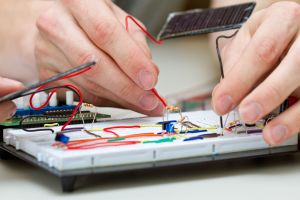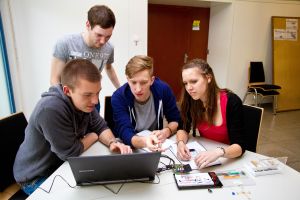Vicinity to practice from the very beginning: At the Department of Electrical Engineering and Information Technology (ETIT) of Karlsruhe Institute of Technology (KIT), freshmen already work on tasks in small teams. This new type of workshop consists of four parts. In tutorials and via the e-learning platform of KIT, the students are supervised. This semester’s program focuses on the modules of “Sensor Technology & Evaluation Electronics” and “Digital Signal Processing & Programming”.
“The workshop links basic subjects with practical project work and trains teamwork at the same time,” says the Studies Dean of the Department Board and examiner of the workshop, Professor Tho-mas Zwick, Head of the Institut für Hochfrequenztechnik und
Elektronik (IHE, Institute of High-frequency Technology and Electronics). “It is our objective to facilitate studies of electrical engineering and to provide for a practical orientation from the very beginning. “The workshop addresses students of electrical engineering and mechatronics in the first and second semesters. This team project is the first of its kind in this early phase of studies. It started in the 2012/2013 winter semester with the modules “Acquisition of Measurement Values & Regenerative Energy Production” and “Analog Filter & Circuit Analysis.” In this summer semester, the engineers-to-be are working on the modules “Sensor Technology & Evaluation Electronics” and “Digital Signal Processing & Programming.” In total, nine scientists and twelve scientific assistants from seven institutes of KIT’s Department of Electrical Engineering and Information Technology are involved in the project. The workshop was initiated by Dr. Tobias Baas, former Ph.D. student at the Institute of Biomedical Engineering (IBT).

The ETIT workshop offers studies close to practice from the very beginning. (Photo: Lydia Albrecht)
Every semester, two of the four courses are run. The students work on the exercises in groups of three or four persons and at home. They use specially manufactured microcontroller boards for the generation and recording of signals. The students are supervised by specially trained scientific assistants both in tutorials and via the ILIAS e-learning platform of KIT. In a wiki, an open software system for the joint generation of websites, and forums, they can cooperate and exchange information with each other.
The workshop is to familiarize the students with basic practical tools of electrical engineering. They learn to handle signals, to acquire and evaluate data, basic electronics, or close-to-hardware programming with a microcontroller. Every course is completed by submission of a documentation of the solutions developed. Upon the successful completion of all four modules, the workshop is passed by the students.
In close partnership with society, KIT develops solutions for urgent challenges – from climate change, energy transition and sustainable use of natural resources to artificial intelligence, sovereignty and an aging population. As The University in the Helmholtz Association, KIT unites scientific excellence from insight to application-driven research under one roof – and is thus in a unique position to drive this transformation. As a University of Excellence, KIT offers its more than 10,000 employees and 22,800 students outstanding opportunities to shape a sustainable and resilient future. KIT – Science for Impact.

